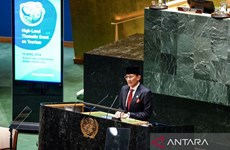Thailand expected to become super-aged society by 2029: research
 Illustrtive photo (Photo: AFP)
Illustrtive photo (Photo: AFP)Bangkok (VNA) – A research by Thai Kasikorn Research Centre (KResearch) has showed that Thailand will become a super-aged society by 2029 due to the decreasing numbers of babies and teenagers from 2020 to 2022.
Reseachers found that the number of newborns started to fall sharply in 2020 when the COVID-19 pandemic broke out and continued to decrease over the next two years, while the fatality rate also increased.
Even worse, the birth rate in the country is now 0.76% per year, and only 1.33% of the people are teenagers.
These numbers are very different from what happened in Thailand during the Baby Boomers age, which includes people born between 1963 and 1983. This year, 1 million Baby Boomers will turn 60.
Researchers said that many things, like the pandemic and people’s worries about money, are adding to this trend of population decline. A more recent trend that some people are deciding not to have children is also affecting these numbers.
KResearch said that it might be hard for the country to only focus on ways to increase the number of people living there, since this could affect both companies and public policies.
Furthermore, businesses are facing challenges because the reduced population means there are fewer potential customers. To make up for the lost income, businesses need to focus on people with more money to spend.
KResearch suggested making changes to goods or services to make them easier for older people to use, since most of them have money problems, and thinking about these services in the context of a global market that is getting older.
It also suggested that the training and development phase for new workers be sped up so that businesses can act quickly to business trends that keep changing.
According to the KResearch, Thai new cabinet might also have to deal with the worrying problem of the country’s shrinking population when making decisions about the country’s competitiveness and social welfare programmes./.












